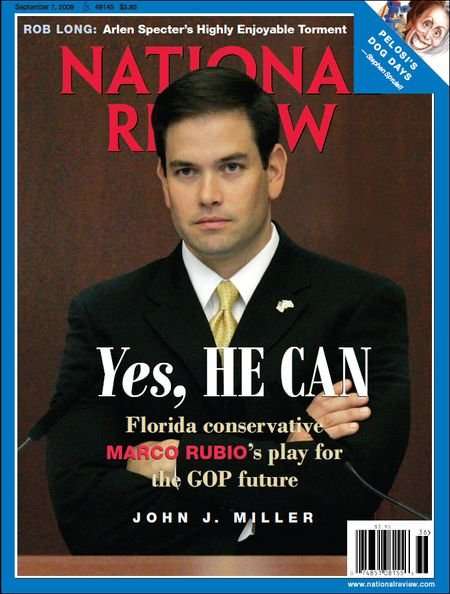Marco Rubio's 7 Lousy Foreign Policy Judgments
If you liked George W. Bush, you'll love the guy who think Bush did a 'fantastic job'

On Monday, I wrote about how Sen. Marco Rubio (R-Florida) is the foreign policy antithesis to Sen. Rand Paul (R-Kentucky) in the 2016 GOP presidential field, frequently sparring directly with his fellow member of the Senate Foreign Relations Committee. To collect some of Rubio's foreign-policy uber-hawkery in one place, I've compiled a list of seven highly questionable judgments by the Cuban-American freshman senator.
1) Supported regime change in Libya. March 30, 2011:
[T]his resolution should also state that removing Muammar Qaddafi from power is in our national interest and therefore should authorize the President to accomplish this goal. […]
For more than four decades, Qaddafi has terrorized the Libyan people, sowed instability among its neighbors, plotted assassination attempts against heads of state and supported terrorist enterprises such as the bombing of Pan Am Flight 103 over Lockerbie, Scotland, which killed 270 innocent people - including 189 Americans.
Inspired by events in Tunisia and Egypt, Libyans have rebelled against Qaddafi's brutal regime, demanding democratic reforms, transparent governance, and respect for basic human and civil rights. […]
The world is a better place when America is willing to lead. And American leadership is required now more than ever.
Bolding mine (as will be below) to highlight the cruel chasm between wishes and reality.
2) Advocates an unconditional authorization of war against the Islamic State. Feb. 11, 2015:
There is a pretty simple authorization [President Barack Obama] could ask for and it would read one sentence: 'We authorize the president to defeat and destroy ISIL.' Period. And that's what I think we should do.
Open-ended declarations of war have not been a friend of liberty or limited government.
3) Wants to make the post-9/11 surveillance state "permanent." January 27, 2015:
We also cannot afford to ignore another lesson of 9/11 and curtail intelligence gathering capabilities that have been legally and painstakingly established following those horrific attacks.
The U.S. government should implore American technology companies to cooperate with authorities so that we can better track terrorist activity and monitor terrorist communications as we face the increasing challenge of homegrown terrorists radicalized by little more than what they see on the Internet.
This year, a new Republican majority in both houses of Congress will have to extend current authorities under the Foreign Intelligence Surveillance Act, and I urge my colleagues to consider a permanent extension of the counterterrorism tools our intelligence community relies on to keep the American people safe.
4) Is in denial about military spending and the national debt. April 14, 2015:
The cause of our national debt is not military spending or discretionary spending in general.
5) Is honestly worried about China becoming the world's leading superpower. March 14, 2013:
So while we are here bickering, there is a nation trying to surpass us as the leading power in the world.
The Chinese Government provides the people no access to the Internet. If you escape China they actually put pressure on governments to forcibly return you. The Chinese Government uses forced labor. Do we want that to be the leading country in the world? So we want that to be the leading voice on this planet? That's the stakes.
For someone who waxes so poetically about the potency of the American dream, Rubio has precious little faith when it comes to comparing our future to that of an authoritarian state.
6) Still thinks the Iraq War was a good idea. Oct. 24, 2010:
MODERATOR: Mr. Rubio, is America safer and better off for having gone to war in Iraq?
RUBIO: I think ultimately, yes. First of all, the world is better off because Saddam Hussein is no longer in charge. He is no longer in charge of that country. Let's understand one thing. Right now we're worrying about Iran possessing a nuclear weapon. If Saddam Hussein was still there you'd have a full-blown arms war the way you've seen between Pakistan and India. So the world is a safer place not to mention the Iraqi people are better off than they were under Saddam Hussein.
More like that on Dec. 3, 2013.
7) Thinks George W. Bush did a heckuva job. April 22, 2012:
George W. Bush, in my opinion, did a fantastic job as president over eight years, facing a set of circumstances during those eight years that are different from the circumstances that a President Romney would face.
If you liked George W. Bush's foreign policy, you'll love Marco Rubio's. If you didn't, there so far isn't much diversity in the 2016 GOP field.


Show Comments (9)